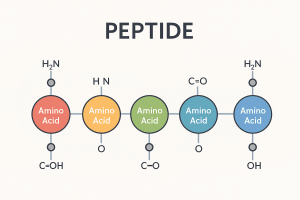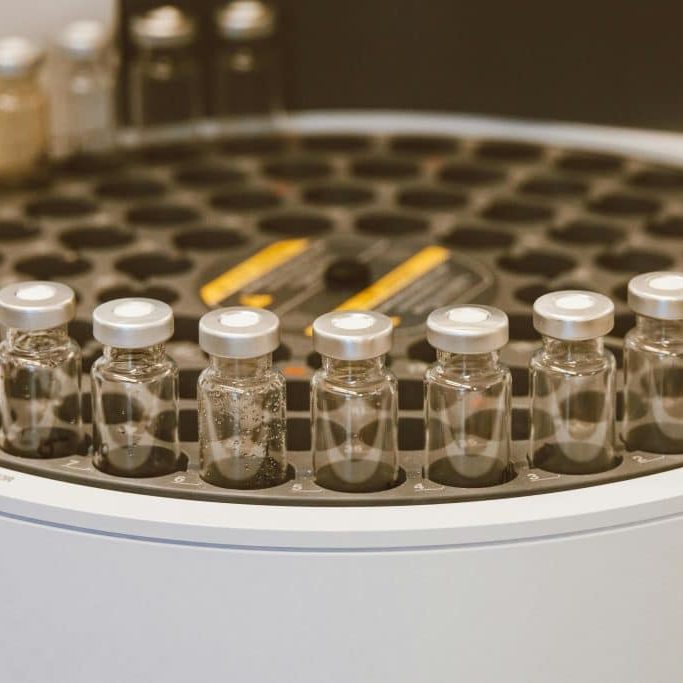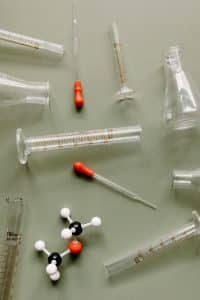The Complete Guide to Peptides for Fat Loss, Muscle Growth, Hormone Optimization, and Longevity
Peptides are no longer the underground secret of elite athletes and biohackers. They’re now front and center in the conversation about fat loss, performance, hormone optimization, and living a longer, healthier life. But with hype comes misinformation.
In this deep dive, based on Cody McBroom’s Choose Hard Podcast interview with hormone optimization expert Jay Campbell, we’ll cut through the noise and explain exactly what peptides are, what they can do for your body, and how to use them responsibly for results that last.
*Disclaimer: This article is for informational and educational purposes only and is not intended to be a substitute for professional medical advice, diagnosis, or treatment. Always consult with a qualified healthcare provider before starting any new supplement, medication, or health protocol, including peptides. The information shared here is based on research and expert interviews but should not be interpreted as a personalized medical recommendation.
What Are Peptides?
Peptides are short chains of amino acids—essentially smaller versions of proteins. They act as signaling molecules in the body, directing cells and hormones to perform specific functions like regenerating tissue, burning fat, improving skin, boosting libido, enhancing brain function, and more.
Unlike pharmaceuticals, peptides tend to have minimal side effects because they break down into naturally occurring compounds. Some peptides already exist in your body in small amounts, and supplementing with them can enhance biological processes that decline with age.

The 4 Key Reasons People Use Peptides
To simplify the landscape, we break peptide usage down into four primary categories:
- Healing & Recovery
- Fat Loss & Muscle Growth (Performance)
- Hormone Optimization
- Longevity & Healthspan
Let’s explore each in detail.
1. Peptides For Healing & Recovery
Use Case: Soft tissue injuries, gut inflammation, joint pain, ligament/tendon damage, post-surgery recovery
Top Peptides:
- BPC-157: Known as “The Wolverine Peptide,” it speeds up healing by increasing angiogenesis (the formation of new blood vessels). It’s effective for joint, tendon, ligament, and gut issues.
- TB-500: Works synergistically with BPC-157 to suppress inflammation and accelerate tissue repair.
- GHK-Cu (Copper Peptide): Enhances skin and soft tissue regeneration, also used for hair restoration.
- Cartilax: A cutting-edge peptide that targets cartilage regeneration, making it powerful for meniscus and labrum injuries.
- Thymosin Alpha-1: Immunomodulator that improves recovery, especially after travel or illness.
Jay Campbell’s Healing Protocol Example:
- BPC-157 + TB-500 + GHK-Cu + Cartilax = 7-10x faster healing from injury, especially in soft tissues.
Real-World Application: If you’ve torn your meniscus or rotator cuff and are considering surgery, you may benefit from exploring peptide stacks before going under the knife—especially if you’re over 40.
2. Peptides For Fat Loss & Muscle Growth (Performance)
Use Case: Shred stubborn fat, maintain/build lean muscle, recover faster from training
Top Peptides:
- Ipamorelin: Stimulates growth hormone release without disrupting natural production. Safe and side-effect free.
- CJC-1295: Often paired with Ipamorelin to enhance its effects. Helps improve sleep and GH output.
- Tesamorelin: Originally developed for HIV patients with visceral fat issues. Highly effective at targeting belly fat.
- SS-31: Mitochondrial-boosting peptide that amplifies cellular energy, especially in athletes.
- MOTS-c: A mitochondrial peptide for overweight or low-energy individuals. Great for improving metabolic rate and workout capacity.
- 5-Amino-1MQ: Improves fat oxidation, strength, and endurance. Can be taken orally or injected.
Jay Campbell’s Pro Tip: For overweight beginners with low motivation to train, using MOTS-c + testosterone therapy can provide the energy needed to get started on a transformation.
3. Peptides For Hormone Optimization
Use Case: Combat fatigue, brain fog, low libido, poor recovery, or aging-related decline
Key Insight: As we age, our natural production of growth hormone and testosterone drops. While HRT (hormone replacement therapy) is a powerful tool, peptides offer a softer entry point to optimize hormone function without full-scale HRT.
Top Peptides:
- GH secretagogues like Ipamorelin and CJC-1295 stimulate natural GH release
- Thymus-derived peptides like Thymosin Alpha-1 support immune and hormonal function
- GLP-1 and GLP-3 Agonists (like Retatrutide): Originally designed for diabetes and obesity, these are now used off-label to manage appetite and improve insulin sensitivity
Important Note: For individuals over 50 with extremely low IGF-1 levels, growth hormone peptides may have limited effect. In those cases, microdosing HGH itself may be more effective and safe than most people think.
4. Peptides For Longevity & Health-span
Use Case: Increase energy, slow aging, improve mitochondrial health, prevent disease, improve skin and hair
Top Peptides:
- GHK-Cu: Improves skin quality, reduces wrinkles, restores hair growth (especially with red light therapy and scalp massage)
- Epitalon: Shown in Russian studies to lengthen telomeres and extend lifespan
- Thymosin Alpha-1: Enhances immune response, particularly after travel or illness exposure
- LL-37 and VIP: Antiviral and antimicrobial peptides that support immune resilience
Jay’s Campbell’s Lifestyle Stack: He travels with peptides like Thymosin Alpha-1 and VIP nasal spray to combat travel fatigue and stay sharp, healthy, and resilient.
Emerging Products to Watch:
- MetaShred: Oral fat loss formula that enhances mitochondrial function and fat oxidation
- BioGut Pro: Comprehensive gut health peptide blend (KPV, BPC, TB-500)
- BioMind: Powerful nootropic stack combining J-147, NuPEPT, and Dihexa for brain clarity without stimulants
Is Peptide Use Legal and Safe?
Peptides are not FDA-approved for medical treatment, but they are legal for research use and widely available through reputable compounding pharmacies or research-grade labs.
There are countless manufactures using pharmaceutical-grade peptides in FDA-certified U.S. facilities. But we HIGHLY advise that you do your research and utilize a reputable pharmaceutical company and/or doctor before using any peptides.
Cody’s Note: Always consult with a trusted medical professional before starting any peptide protocol. If you’re using peptides, use them responsibly and from quality sources.
How to Get Started with Peptides
- Get Lab Work Done First. Know your testosterone levels, IGF-1, inflammatory markers, and overall health status.
- Identify Your Main Goal. Healing? Fat loss? Energy? Longevity?
- Start Small. Don’t stack 10 things. Begin with 1-2 peptides and monitor your response.
- Use Consistently. Most injectables are daily or 5x/week. Many are now available via easy-to-use pens (like insulin pens) to simplify the process.
- Support with Lifestyle. Peptides amplify good habits—they don’t replace them. Nutrition, training, sleep, and stress management still come first.
Final Word
Peptides are not magic pills—but they are powerful tools. When used correctly, they can drastically improve the quality and longevity of your life. But they require education, discipline, and ownership.
If you’re ready to take your performance, health, or physique to the next level, peptides may be a strategic addition to your toolkit. Just remember:
- Do plenty of research, first.
- Ask the right questions, to the right professionals.
- Always prioritize your general health, before hormonal optimization.
And as always—Hire an online-coach to ensure you’re doing all the right things with your training and nutrition BEFORE embarking down the path of peptides!
You can listen to the full Choose Hard Podcast episode with Jay Campbell below, as well as subscribe to the Choose Hard Podcast for more episodes just like this!





















































































































































































































































































































































































































































































